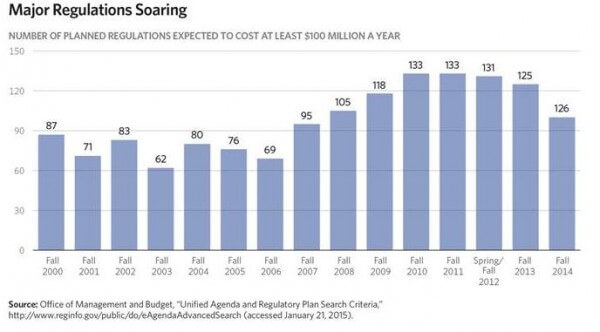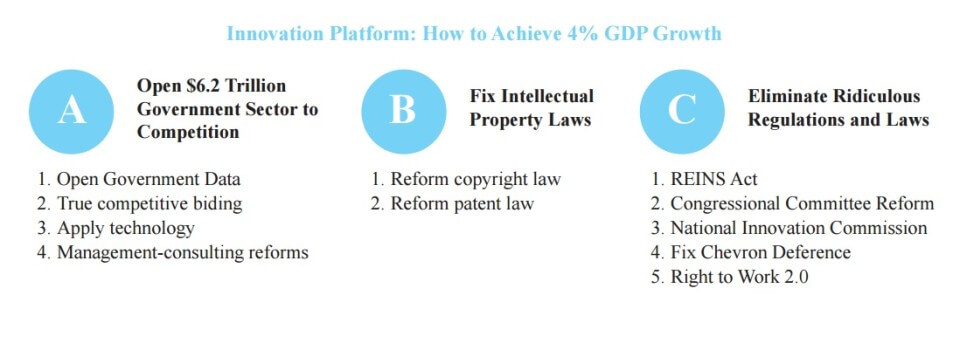Ricochet is the best place on the internet to discuss the issues of the day, either through commenting on posts or writing your own for our active and dynamic community in a fully moderated environment. In addition, the Ricochet Audio Network offers over 50 original podcasts with new episodes released every day.
 Should Republicans Be Focusing Way More on Deregulation Than Tax Cuts?
Should Republicans Be Focusing Way More on Deregulation Than Tax Cuts?
Republicans are sort of boxed in when it comes to taxes. For three decades, tax cuts have been the party’s core issue, and a winning one at that. It helped give the party two two-term presidents and control of Congress after decades in the minority. But today (a) the top rate is 40%, not 70% as it was in 1980; (b) more than 40% of Americans pay no income taxes; (c) federal debt, as a share of GDP, has more than doubled since 2007; (d) a tsunami of entitlement spending is coming; and (e) the American public doubts the pro-growth impact of high-end tax cuts.

So while smart, fiscally sound tax reform — particularly on the business side — is certainly key to improving the US economy’s long-run growth potential, maybe there is more political and policy room in other parts of the supply-side portfolio. Like deregulation, which may have more oomph with voters in a populist mood and which dovetails with a pro-Uber, disruptive innovation, anti-cronyist agenda. A few things on that front:
1.) A new, must-read report by Lincoln Labs offers a slew of 21st century, deregulation ideas:

2.) A new Mercatus report suggests regulation inhibits business growth and job creation while protecting larger, existing businesses:
In a new empirical study for the Mercatus Center at George Mason University, economists James Bailey and Diana Thomas show that more regulated industries experienced fewer new firm births and slower employment growth between 1998 and 2011, and that regulations inhibited employment growth primarily in small firms rather than large firms. These results call into question the value of new federal regulations, because increased regulation seems to contribute to the declining number of new businesses and to slowing job growth.
3.) And some areas of possible focus from Noah Smith in his Bloomberg column:
For example, the scope of occupational licensing, which economists mostly believe is a drag on growth, is startling, and seems to have no good reason behind it. The Barack Obama administration has actually started to address the issue, stealing a march on conservatives. If Republicans want to depict themselves as the real deregulators, they might want to try taking up this issue.
Another concern is environmental regulation that blocks the development of infrastructure. Although some environmental regulations are necessary — you want to keep breathing clean air, right? — local development opponents are often able to use costly environmental reviews to block needed infrastructure.
A third area is zoning. As the incentives for density have risen, zoning regulation has become an increasing burden on growth. It might be time for the federal government to step in and encourage localities to relax their land use policies.
A fourth worry is the Food and Drug Administration. George Mason University economist Alex Tabarrok has argued that the FDA needs to overhaul and streamline the process it uses to approve critical new drugs and medical devices.
A fifth area is the Sarbanes-Oxley Act. The decline in publicly listed companies on U.S. exchanges and initial public offerings is disturbing. Though there is some evidence that the law wasn’t responsible for all the reduction, many believe that it is one culprit, and should be reformed.
4.) Venture capitalist Marc Andreessen on innovation clusters:
Published in EconomicsBut policymakers shouldn’t be trying to copy Silicon Valley. Instead, they should be figuring out what domain is (or could be) specific to their region—and then removing the regulatory hurdles for that particular domain. Because we don’t want 50 Silicon Valleys; we want 50 different variations of Silicon Valley, all unique from each other and all focusing on different domains.
Imagine a Bitcoin Valley, for instance, where some country fully legalizes cryptocurrencies for all financial functions. Or a Drone Valley, where a particular region removes all legal barriers to flying unmanned aerial vehicles locally. A Driverless Car Valley in a city that allows experimentation with different autonomous car designs, redesigned roadways and safety laws. A Stem Cell Valley. And so on.
There’s a key difference from the if-you-build-it-they-will-come argument of yore. Here, the focus is more on driving regulatory competition between city, state and national governments. There are many new categories of innovation out there and entrepreneurs eager to go after opportunities within each of them. Rethinking the regulatory barriers in specific industries would better draw the startups, researchers and divisions of big companies that want to innovate in the vanguard of a particular domain—while also exploring and addressing many of the difficult regulatory issues along the way.




Yes.
Yes.
However, most of the examples here are state/local regulations not Federal.
Yes, but that should not be confused with a cavalier attitude toward raising taxes.
I would agree that deregulation is critical. The Standard’s Blake Hurst wrote an insightful article Immiserating the Poor on the mother of all unleashed regulators – the EPA.
Well, I haven’t actually seen where they were working hard on ‘cutting taxes’ either.
What I’ve seen are attempts at re-working the tax code to reduce taxes for some, while transferring the burden elsewhere – a ‘redistribution’ of the burden, if you will.
They need to focus on reducing the size and scope of government overall – both regulatory and and spending. Unfortunately, the republicans office-holders have no will to do this. This is one of the reasons they’re losing their base.
Even the tax changes that are going to be most meaningful are going to be aligned to this approach. When people talk about lower the rate/ broaden the base, mostly they’re talking about reducing the myriad of specific deductions that are currently on the books. which, from a certain perspective, look an awful lot like regulations.
They also tend to look a lot like tax hikes.
Agreed, agreed. I want to do both, but I think that deregulation may have bigger potential, and I think it will play better to the electorate. Frankly, I’d like to take schools as our issue, too! Let’s be for the children while we’re at it.
Let me offer a plug for Arthur Brooks latest book and suggest that we campaign on helping people as much as possible, and that taxes, regulation and schools are simply a means to do so. They are not the issues in and of themselves. Helping people is the issue.
Paul Krugman, a liberal Nobel-prize-winning economist and New York Times columnist, wrote recently that excessive regulation was forcing people in northeast states to migrate to states like Texas, as it made housing and rental costs too high. So he might be used to defend against attacks from the left of ‘heartless deregulation favoring big business.’
Yes. Regulation is tax.
Yes.
This might be the first time I’ve unequivocally agreed with JP.
Neither.
They should focus on instituting a crazy patchwork of state and local regulation and eliminating the corrupt, abusive, overly centralized regulation preferred by Democrats and the GOP donor class. They should focus more on the quality of regulation and less on the quantity of it.
I applaud and support the efforts of local governments to use their powers to block infrastructure and growth. All conservatives should, in the sense of, “I may disagree with what you regulate, but will fight to the death for your right to regulate it.”
The term “growth” is becoming a euphemism for opposition to free markets, free enterprise and property rights. Maybe “infrastructure” is, too.
@The Reticulator- “I applaud and support the efforts of local governments to use their powers to block infrastructure and growth.”
Why are you so indifferent to the consequences? Houston has no zoning laws, as far as I know, and I read that in a recent year more single-family homes were built in that one city than in the entire state of California. People need housing and jobs.
I applaud Houston’s choice. I’m in favor of caring a lot about the consequences, just as I care when the consequences of our economic system result in greater income inequality. But I’m not in favor of engineering the consequences as some of the “growth” advocates want to do.
In many ways it’s the same issue. The regulatory regime is so vast and complex that nobody understands it except the specific interests affected by a particular set of regulations. Thus like tax reform, regulatory reform will just be a giant log roll among interests ending in some net reduction that makes for a good sound bite. Both must be attacked with a blow torch, chain saw and a heavy caterpillar tractor. Clear cut, burn the stumps and plant a much simpler garden to replace them. Most can be replaced with clear law written and voted on by the Congress not armies of regulatory bureaucrats and the interests that instruct them.
“Helping people” is not the issue. The issue is getting out of the way, and allowing people to help themselves. I cringed when Bush said something to the effect that “when people hurt, government has to move.”
I understand, of course, that that horse left the barn a long time ago.
Absolutely. Regulatory reform is more important right now, and cutting regulations has a double positive effect of increasing growth and cutting the size and cost of government.
The biggest issue facing companies right now is uncertainty. Uncertainty driven by an over-leveraged economy, the impending explosion of entitlements, the instability in the world, the distortion of signals by government intervention through regulation and manipulation of the money supply, etc.
We need to start stabilizing the environment businesses operate under. Shrinking the regulatory burden and associated uncertainty is a good start.
In Canada the Federal Government passed a law that says you cant issue a new regulation without deleting an old one.
Given the growth of Regulation in the US Fed, that would probably stop the state cold.